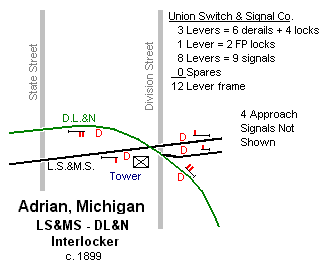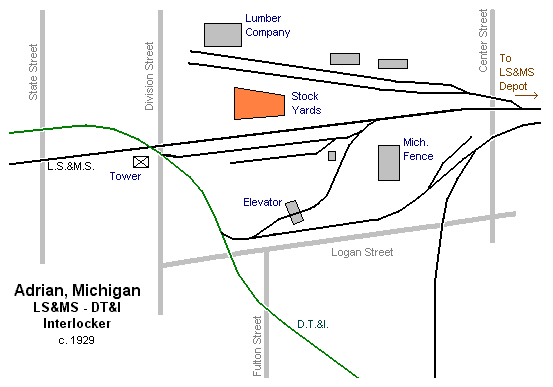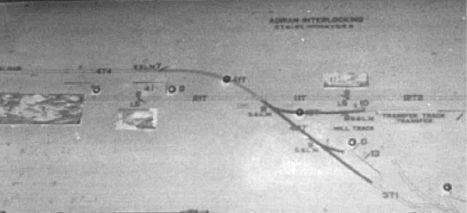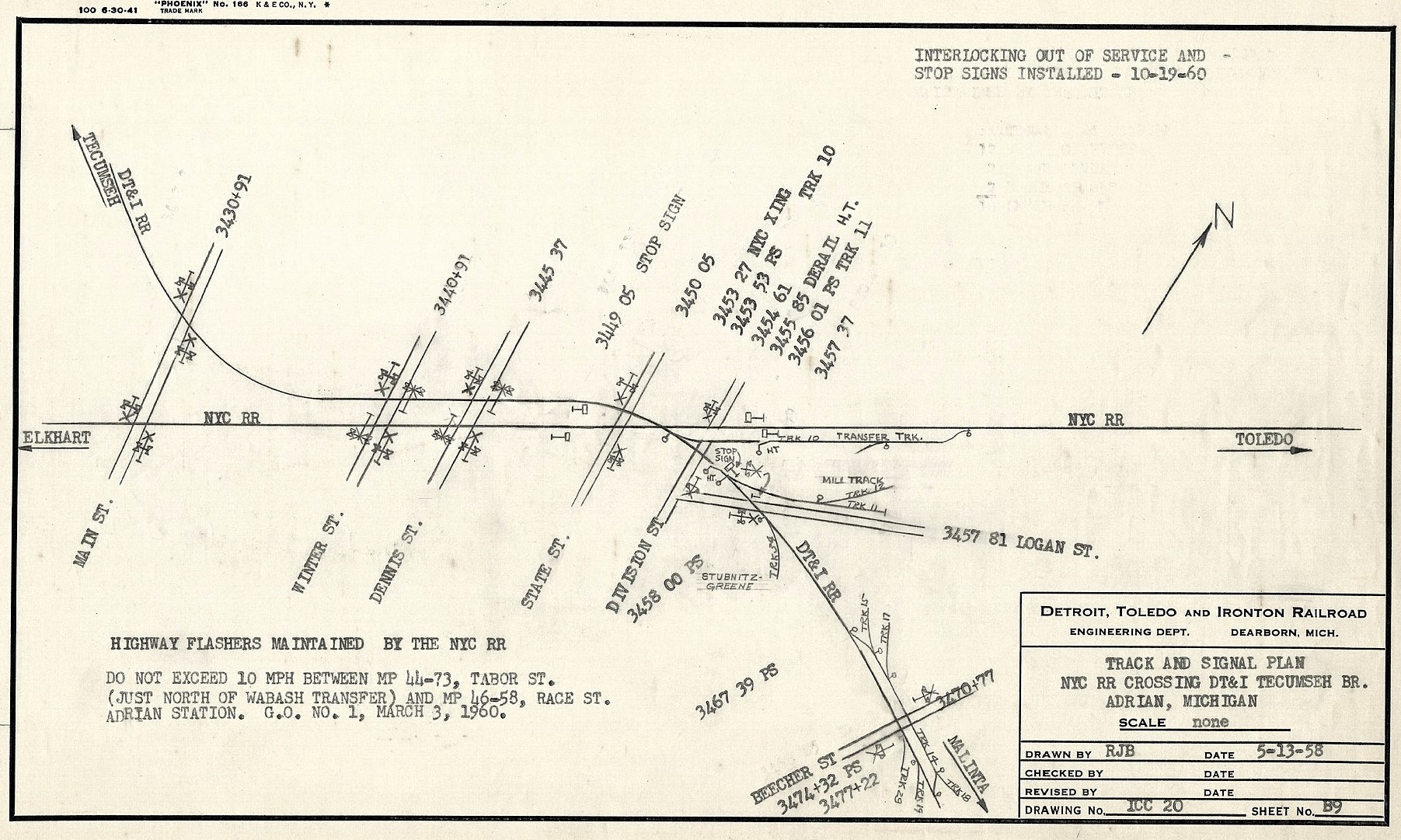- Details
- Hits: 4348
Interlocking: Adrian, MI - DT&I Tower




Adrian had three interlocking towers at the turn of the century. The busiest was the Lake Shore/Wabash interlocker on the east side of town. There was also an interlocker at "South Adrian", where the DT&I crossed the Wabash. The interlocker on this page was the crossing of the Detroit, Lima & Northern (later DT&I) with the Lake Shore & Michigan Southern (later NYC, Penn Central, Conrail and now Adrian and Blissfield). This tower was staffed by the LS&MS (NYC) until 1931.
This interlocker was a tower with a 12-lever interlocking frame made by Union Switch & Signal according to records at the State of Michigan archives. The crossing was located at Division Street, about 1/2 mile west of the LS&MS depot. The interlocking was protected by mast signals and derails (half switches). In addition to the four main directions, the east end of a LS&MS passing track was also signaled.
Image info: Top, a map of the interlocking in 1899. 2nd photo, another version from 1929. [Both drawn from blueprints at the State of Michigan Archives by Dale Berry}. 3rd photo, the model board at the DT&I interlocking tower. [Robert Ellis]. 4th image, a drawing of the crossing from 1958, after the stop signs were installed. This was a DT&I drawing which shows a 10-car transfer track along the NYC, a passing track over Beecher Road on the DT&I and several spur tracks to various businesses.
Notes
Time Line
1903. This was a Saxby-Farmer lever machine by Union Switch & Signal Co. [MCRF-1904]
1926. The Detroit, Toledo & Ironton replaced the semaphore signals protecting their track to search light target and approach signals. This was no doubt part of a major technology upgrade to the DT&I following Henry Ford's ownership.1929 - The interlocking remained the same, but the following maps (copied from those in the State Archives) gives a better indication of industry to the west of the interlocking at the time: March 25, 1930 - The Michigan Railroad Commission approved the cut back of staffing at the tower from round-the-clock coverage to one man, Monday through Saturday from 9:00 a.m. to 5:00 p.m. On January 8, 1931, the MRC allowed the total discontinuance of the leverman at the crossing. In the railroad's filing, they explained that the DT&I ran only 1 train each way per day. The approved plan called for the interlocking plant to be set for through travel by the New York Central. If the DT&I needed to cross, the trainmen would go into the tower and operate the levers. The conductor on the caboose would then return the line up to the NYC after the train passed through. 1960 - The interlocking was removed and stop boards were installed for both roads in all directions. Trains on both roads were then required to come to a complete stop, assure that the way was clear, and then proceed. Early 1990's - The crossing was removed as the DT&I north of the Conrail was no longer used. A switch was installed to connect both lines and it exists today (2001).
Bob Ellis comments on his visits to the DT&I tower in 1959: "The DT&I Tower was always called that name by the NYC men. I was able to get into the DT&I tower one day when there was no operator to take the photo above of the model board. The tower was not manned and the signals were normally set for the NYC Old Road. The door was locked with a big DT&I railroad lock. The DT&I train crew coming through would unlock the tower, go in and manually line up the cross route and after the train had passed, they would reline it for the Old Road. Even at this time, there was still a little phone with a crank ringer that still worked. I called my friend who worked at WB Tower (down the line at the Wabash Crossing) and talked to him. At this time (1959) the tower must have been unmanned for many years." [Editor's Note: According to the information in the State Archives, the tower was no longer manned after 1931, 28 years before Bob's visit].
1930. March 21. The Michigan Public Utilities Commission allows the NYC to discontinue use of an operator at this crossing except between 9:00 a.m. and 5:00 p.m. daily except Sunday as the DT&I has completed the Malinta cut-off and there are no longer any scheduled trains on this branch. The petition came from the DT&I and there were no objections from the NYC. [MPUC-1930]
1924. In the Matter of the Application of the Detroit, Toledo & Ironton Railroad Company for Permission to Change the Locking in the Interlocking Tower at the Crossing of the New York Central Railroad with the Detroit, Toledo & Ironton Railroad at Adrian so that the Main Line Route Can Be Cleared on the New York Central Railroad's Main Line as Shown on Blue Print S-C 330-I. 943–59. January 3, 1924. The said blue print having been approved by the officials of the
New York Central, and the Detroit, Toledo & Ironton Railroads, and the reason set forth in said application for such request being that it is the desire of the Detroit, Toledo & Ironton Railroad Company to close the interlocking tower at the said crossing from 11:59 P. M. each Saturday until 11:59 P. M. each Sunday because there are no Sunday movements over this railroad and, therefore, the request that such change be made so as to be relieved from maintaining a towerman between the time herein specified; The Commission after due consideration of said application together with said blue print has concluded that the request is a reasonable one and, further, that no objection could be reasonably offered why such request should not be granted for the reason that no dangerous conditions are created by such change because there are no trains operating on the Detroit, Toledo & Ironton Railroad between the time herein referred to.
THEREFORE, it is HEREBY ORDERED, That permission be and the same is hereby granted to the Detroit, Toledo & Ironton Railroad Company to change the locking in the interlocking tower at the crossing of the New York Central and Detroit, Toledo & Ironton Railroads in Adrian so that the main line route on the New York Central Railroad may be changed as shown on said plans and against the movements on the side track of the New York Central Railroad and main line of the Detroit, Toledo & Ironton Railroad ; and It is FURTHER ordered, That said plans as submitted be and the same are hereby approved and one copy of the same ordered placed on file in the office of the Commission as File No. 943-59.
MICHIGAN PUBLIC UTILITIES COMMISSION
1931. The MPUC grants permission to discontinue the leverman as now maintained in the interlocking plant provided that the signals are normally set clear for movements on the NYC, to be operated by DT&I train crews as needed to cross. [PMUC-1931]
Bibliography
The following sources are utilized in this website. [SOURCE-YEAR-MMDD-PG]:
- [AAB| = All Aboard!, by Willis Dunbar, Eerdmans Publishing, Grand Rapids ©1969.
- [AAN] = Alpena Argus newspaper.
- [AARQJ] = American Association of Railroads Quiz Jr. pamphlet. © 1956
- [AATHA] = Ann Arbor Railroad Technical and Historical Association newsletter "The Double A"
- [AB] = Information provided at Michigan History Conference from Andrew Bailey, Port Huron, MI

